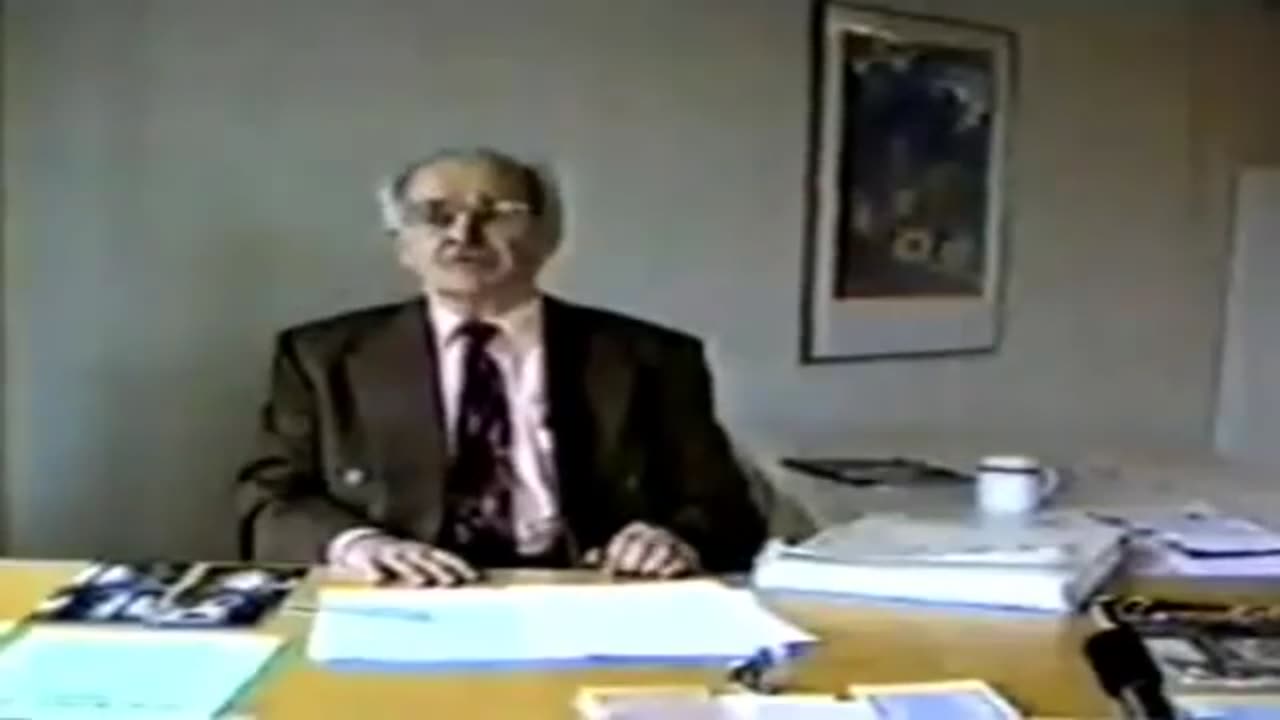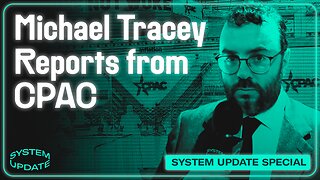Premium Only Content

Robert Faurisson in Sweden 1992 (English)
Robert Faurisson, né le 25 janvier 1929 à Shepperton (Royaume-Uni) et mort le 21 octobre 2018 à Vichy, est un militant négationniste français.
Professeur de lycée puis maître-assistant en lettres modernes à l'université, il connaît un début de notoriété à partir de la fin des années 1960 en publiant une étude sur Rimbaud, puis un moindre succès avec sa thèse consacrée à Lautréamont. À la fin des années 1970, il accède à la célébrité à travers une série de scandales médiatiques et de procès en raison de sa négation du génocide juif. Il devient en France, à partir des années 1980, une icône des négationnismes d'extrême droite et d'ultragauche, convergeant dans les années 2000 dans une partie de l'antisionisme en Occident comme dans le monde arabo-musulman. Jugé antisémite, proche des milieux d'extrême droite, voire néonazis, il est condamné à plusieurs reprises pour « incitation à la haine raciale » et « contestation de crime contre l'humanité ».
Figure emblématique du négationnisme, il ajoute aux auteurs fondateurs de ce courant, Paul Rassinier et Maurice Bardèche, une fixation sur la négation de l'existence des chambres à gaz. Il joue sur l'apparente crédibilité d'une démarche hypercritique pseudo-scientifique, unanimement disqualifiée dans le monde de la recherche. Qualifié de « faussaire de l'histoire » par Robert Badinter, il attaque ce dernier en diffamation mais est débouté par la justice qui acte cette qualification en 2007. Dans un jugement du 6 juin 2017, confirmé en appel le 12 avril 2018, le tribunal de grande instance de Paris établit qu'écrire que Faurisson est « un menteur professionnel », un « falsificateur » et « un faussaire de l’histoire » est conforme à la vérité.
Robert Faurisson, born January 25, 1929 in Shepperton (United Kingdom) and died October 21, 2018 in Vichy, was a French Holocaust denier.
A high school teacher then a lecturer in modern literature at the university, he began to gain notoriety from the end of the 1960s by publishing a study on Rimbaud, then less success with his thesis devoted to Lautréamont. In the late 1970s, he rose to fame through a series of media scandals and lawsuits over his denial of the Jewish genocide. He became in France, from the 1980s, an icon of far-right and ultra-left negationism, converging in the 2000s in part of anti-Zionism in the West as in the Arab-Muslim world. Deemed anti-Semitic, close to extreme right-wing circles, even neo-Nazis, he was convicted on several occasions for “incitement to racial hatred” and “dispute of crimes against humanity”.
An emblematic figure of Holocaust denial, he adds to the founding authors of this current, Paul Rassinier and Maurice Bardèche, a fixation on the denial of the existence of the gas chambers. It plays on the apparent credibility of a hypercritical pseudo-scientific approach, unanimously disqualified in the world of research. Qualified as a "forger of history" by Robert Badinter, he sued the latter for defamation but was dismissed by the courts which acted on this qualification in 2007. In a judgment of June 6, 2017, confirmed on appeal on April 12, 2018, the court High Court of Paris establishes that writing that Faurisson is "a professional liar", a "falsifier" and "a forger of history" is consistent with the truth.
The archive in french & English : https://robert-faurisson.com/
-

FreshandFit
7 hours agoAfter Hours w/ Girls
75.4K55 -
 2:33:58
2:33:58
TimcastIRL
9 hours agoDan Bongino ACCEPTS Deputy FBI Director, SECRET NSA CHATS EXPOSED w/Joey Mannarino | Timcast IRL
146K78 -
 1:09:33
1:09:33
Glenn Greenwald
13 hours agoMichael Tracey Reports from CPAC: Exclusive Interviews with Liz Truss, Steve Bannon & More | SYSTEM UPDATE #412
96K80 -
 56:02
56:02
Sarah Westall
10 hours agoBiohacking & Peptides: Weight loss, Anti-Aging & Performance – Myth vs Reality w/ Dr. Diane Kazer
45.3K14 -
 11:22
11:22
Bearing
20 hours ago"Anxious & Confused" Federal Workers FREAK OUT Over DOGE Efficiency Email 💥
64.2K64 -
 1:31:20
1:31:20
Flyover Conservatives
1 day agoUS STOCK MARKET: Sinking Ship - Dr. Kirk Elliott; How I Fought Back Against Woke Schools & Stopped Gender Bathrooms - Stacy Washington | FOC Show
67.7K3 -
 1:08:09
1:08:09
Donald Trump Jr.
14 hours agoFBI Dream Team, Plus Taking Your Questions Live! | Triggered Ep.219
208K281 -
 7:32:37
7:32:37
Akademiks
14 hours agoDrake and PartyNextDoor '$$$4U' Album Sells 250K first week. BIG AK IS BACK.
124K18 -
 3:12:08
3:12:08
MyronGainesX
13 hours ago $32.56 earnedDan Bongino Named FBI Deputy Director, Trump Meets Macron, And More!
100K31 -
 3:12:31
3:12:31
vivafrei
13 hours agoBarnes Live from Seattle - Defending Benshoof in a Case that is CRAY CRAY!
166K53